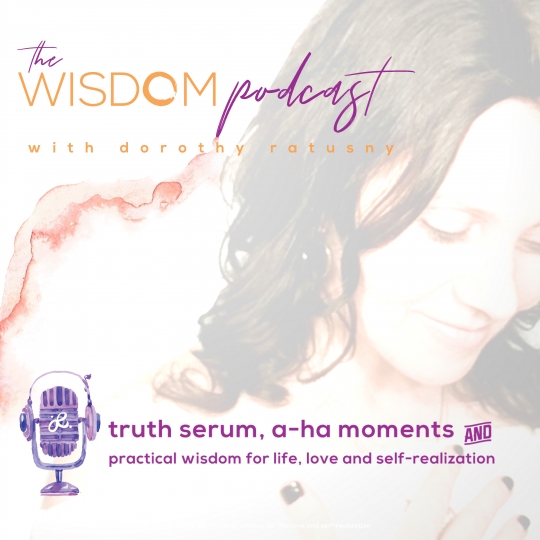
Teach Your Children To Love and Value Themselves
The WISDOM podcast Season 1 Episode 9
with Dorothy Ratusny
TIMESTAMPS:
Podcast Intro: 0-1:31 | Your FREE ‘Downloadable Wisdom Tools’ For This Episode: 1:33-2:45 | Is This You? – A Woman Walks Up To A Mirror… 2:50 | Feedback From Listeners on This Episode: 3:55 | Two Positive Takeaways From This Episode: 4:32 | Our Caregivers Have One Sacred Opportunity to Build Self-Esteem: 5:43 | The Real Life Client Story of Janet: 6:35 | Podcast Outro: 18:21
A woman walks up to a mirror, her eyes scowling as she looks critically for what is ‘wrong’; for what she doesn’t like about herself. Her thoughts are self-effacing and hurtful. No one can hear the harsh words that she tells herself. The woman doesn’t see all of her natural beauty, all of what makes her uniquely perfect. She no longer remembers a time when she didn’t question her appearance or anything that allowed her to feel good about herself. This woman is many women; and any person who has grown up with the constant messaging that they are not ‘okay’; that there is something wrong with who they innately are. This is how we come to learn that we are not enough even though this could not be further from the truth.
On a pre-release of this episode, I received many comments from listeners who observed how the story of my client Janet resonated with them and their life experiences. You’ll find their feedback and comments here as I believe its important to share the messages that so many of us suffered disparaging feedback and critical words even if our caregivers did not intent to negatively affect our self-esteem and worth.
In this episode, my hope is twofold: first, that if you can relate to the story of Janet, that it helps you break the patterns of critical and hurtful self-talk that has caused you to diminish your abilities and inherent potential; so that you may change what you say and believe. Second, that as a parent, you are now more aware of what messages you are sending to your child and what you are teaching by what your child or children witness of you.
As you listen to this episode, I hope that you will be helped by the practical teachings, strategies and guidance for how you can reclaim what has always been yours; that is, your personal sense of pride in who you are; your invincibility and that you are uniquely perfect as you are, even as you may be working on aspects of yourself to become more.
“Wow this was so good I will have to re-listen. It brought up so many feelings and emotions realizations of relationships structures.” Tina Farmington Hills, USA
“Thank you for sharing this! I can relate to Janet and it has been so hard to accept myself after all of these years. We need to be kind to our children and break this cycle!” Tracy W Pennsylvania, USA
“It’s never ‘okay’ to accept hurtful comments and words from our loved ones. ”
– dorothy ratusny
Our caregivers have but one sacred opportunity to help us nurture and develop healthy self esteem; and this occurs during the earliest part of our life – fundamentally in the first five years as we are learning and taking in so much information about how to navigate successfully in our environment and within the social mores and customs of our culture and the world at large. We need unconditional love and nurturing to develop trust in our self and our abilities and to thrive in the world. Feeling secure and safe helps build our confidence to be self-reliant and successful, and to know that we are lovable and ‘good enough’.
For all of Janet’s life she could remember how her sisters were ungrateful, uncaring and selfish. They could also be at times, aggressively mean and vengeful. Janet did her best to stay out of the conflict and pettiness that her siblings engaged in, but the truth was, she had also received unkind and hurtful words from both parents throughout most of her childhood. Janet’s father would often tease her about her weight, saying, “You could be pretty except you are so big.” When Janet would ask to wear clothes similar to her older sister, her Mother would say, “you can’t possibly wear the same pretty clothes, your body is too big and you won’t look good.”
It may not surprise you to learn that Janet struggled with her weight, all of her adult life. As a child she weighed a normal and healthy weight for her height, although she never thought of her weight as normal since she was constantly teased about being ‘big’. In reality, my client Janet happens to be of ‘model’ height. She stands over six feet and her height naturally dictates the density and structure of her bones. This was often overlooked and unexplained in the numbers that were so harshly judged by the scale.
We can cultivate an eating disorder and body image issues in most anyone if we begin at an early age to tease and mock them about how unappealing or unattractive they look. The truth is that Janet could easily have been a model for her height and features are stunning. Unfortunately, years of self-loathing and ridicule were among the learned habits that Janet adopted rather than a confidence and love of herself and of her unique physical attributes. As such, the negative and critical self-talk permeated into other areas of her life and Janet often felt tormented rather than loved and appreciated. It was a life in which her self-esteem and worth were repeatedly diminished based on being judged on her appearance.
We need to remind ourselves and teach our children that beauty is far beyond what we see at the surface. Janet is incredibly intelligent and may have chosen any career path. For the past three decades, she worked in financial securities where she headed a team that liked and respected her. Before Janet and I began working together it would be unheard of for her to speak her mind to her boss or her siblings, especially when unrealistic demands were made of her.
Part of the journey of reclaiming herself, of learning to like and also love who she was included Janet becoming more comfortable with asserting boundaries; saying ‘no’ to unreasonable or demanding requests, both at work but also to the loved ones who still tormented her with their critical comments and teasing.
If you teach your children that it is acceptable to expect much of them; if you are overly critical rather than approving and accepting with unconditional love; then you will raise children who seek love and approval of others rather than from within. If you demand of your children that they model behaviours, life choices, and beliefs based on what you approve of, you give them an impossible task that they can never be wholly successful at.
If you mistreat or diminish your child’s sense of worth, if you place pressure on your children for having certain standards of intelligence, beauty, or competency in a specific skill or talent; and if you judge them as somehow different or “less than” what you would deem as ‘good enough’, you can create much damage.
Even with the many successes in her life, Janet still had a difficult time validating her worth and feeling self-adequate and competent. She still continues to overachieve at work doing far more than is expected of her, although she now appreciates that this is by choice because she enjoys her career, has an impeccable work ethic (that she is proud of), and her high achieving contributes to her self-confidence.
As an adult, Janet’s sisters continued to make demands on her using guilt tactics and hurtful words, and were never satisfied with what she did for them. This was a cycle of emotional and verbal abuse that continued until Janet and I began to deconstruct how these constant and unreasonable demands of her reinforced her core belief that she was not good enough. This early and well ingrained core belief began a pattern in which Janet sought approval, acceptance, and love from her family by going above and beyond in acts of kindness and generosity.
“If you are in a position of power and authority, and if you abuse this power when others look to you for love and validation, you may create a co-dependency whereby others base some or much of their esteem and worth on your approval.” – dorothy ratusny
You would never want your children to grow up looking to others in order to feel worthy and good enough. You can encourage achievement but then allow your child to decide what their achievements will be. If you judge your children as somehow “less than” or “not good enough” based on unreasonable standards, you can create much damage.
I also work with adult clients who have experienced the heartache of being criticized and ridiculed by those who ought to have loved and protected them. From their stories, I can reinforce how important it is to teach your children how to see and know their value and worth, their beauty, their intelligence, and their ability to be successful as a monumental aspect of helping them to develop their self-esteem and for having belief in their abilities. Teach your children how to value themselves highly by being demonstrative and encouraging of your child’s greatness. Then you will see that your child is motivated to succeed in large part because they believe in their abilities and their potential.
For parents who themselves struggle with the outward and often performance-based societal standard of ‘success’ and if they allow external influences to supersede the innate beauty and worth of their child, please let me help. Please consider the standards that you are choosing to set for your child because of what you believe in. And yes, it is true. You likely adopted your beliefs from what you heard, read, saw and were taught by your caregivers.
You encourage authentic happiness and self-love in your children by encouraging them to appreciate their unique talents, abilities and interests and by reinforcing your child’s value and self-worth.
Janet learned through our work together, to enforce healthy boundaries for herself; to be strong willed and to say “no” when she experienced an unreasonable demand or the suggestion of guilt for not doing something for her sisters. She began to focus on her health, working with a personal trainer and nutritionist so that she could take control of her previous self-sabotaging behaviours; to no longer eat junk food and be unhealthy because she began to see her worth and her ability to make good choices for herself as valuable and important for growing her self-esteem and for self-care and self-love.
You can stand your ground to others politely, firmly and perhaps with an injection of humour as you speak your truth. You can also begin to see your worth as something that is not based on whether you are skinny, smart enough, or beautiful by societal standards; but rather to witness and appreciate yourself first – as you are – with acceptance, self approval and loving kindness. You can honour a path that you determine is right and best for who you are based on liking and loving your self wholly and completely because ultimately – you are more than enough. You may just need to keep reminding yourself of this – first and always.
*The name of my client and others have been changed to maintain confidentiality. Additional details or circumstances may also have been altered in order to ensure their utmost privacy.
Sharing the wisdom and beauty of divine love with you…
Namaste!
Podcast Theme Music: ‘Aura’ from the Album, Illuvia by Eternell www.eternell.net/album/illuvia
Accompanying Music: Eternell- Illuviation
A generous ‘thank you’ to Audio Engineer, P. Kirpikau for your excellent work!















Leave A Comment
You must be logged in to post a comment.